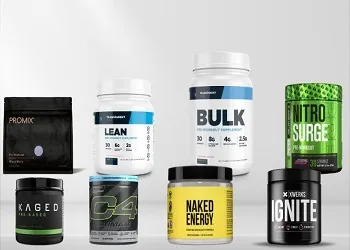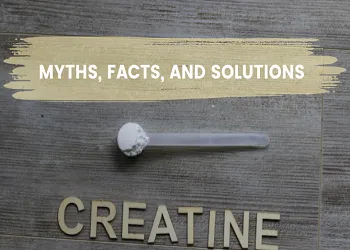Is whey powder better than plant-based protein? Or is it the other way around? Well, the answer is subjective and depends on a number of factors (not what you want to hear, right?). Like most health-related things, the answer isn’t straightforward — so let’s break it down.
For this article, we’ll focus on two popular protein choices: whey protein powder and plant-based protein powder. We’ll lay out the pros and cons of both, so you can make an educated decision the next time you’re supplement shopping.
We’ll discuss what your body needs from a protein supplement, the ins and outs of whey powder, plant-based options, and some suggestions of what to look for on protein nutrition labels. Once you decide which protein supplement is best for you, test it out with your fitness training and get those gains!
Now, let’s talk about whey vs. plant-based protein. But first…
Table of Contents
Why Do You Need Protein?
Getting sufficient protein is vital to your whole system — each cell in the body contains protein, so you need it to repair cells and create new ones. In the context of fitness, consuming protein helps repair the microtears in your muscle fibres that you make when weightlifting and training.
You may have heard of amino acids, which is really what we’re talking about when we discuss protein. The structure of a protein molecule is made up by a chain of amino acids. There are different types of amino acids (twenty total), but the body doesn’t create all of them naturally. However, the body can synthesize and use amino acids that come from supplements.
And these amino acids that the body can’t produce? There are 9 of them — called essential amino acids (EAAs) — and they have to be consumed through whole food and supplements. So, an ideal protein powder supplement contains all 9 EAAs, making it a complete protein.
Protein supplements are a massive help in getting enough dietary protein. But with so many options available (and corresponding marketing ploys), it’s tough to determine what to choose. You may have dietary restrictions, digestive issues, ethical concerns, a tight budget, or lofty fitness goals. Is whey or plant-based better for you?

The Case for Whey Protein
First, let’s address what whey is. You might think it’s milk, right? Not exactly. It’s a milk protein that’s a byproduct of making cheese from pasteurized milk. When the milk curdles to make cheese, liquid whey separates from the solid, which can then be spray-dried to create a powder.
Benefits of Whey Protein
- It’s a complete protein that contains all 9 essential amino acids. In fact, whey protein isolate is the most bioavailable option on the market.
- Whey protein is absorbed quickly by the digestive system.
- It gives protein shakes a creamier texture.
- You get more grams of protein per serving than other protein powder options.
- It can be less expensive than other options, depending on the brand.
Potential Negative Sides of Whey Powder
- If you suffer from lactose intolerance, whey protein may cause digestive issues since it’s a milk protein.
- It’s a product of the meat and dairy industry, which may not align with your values.
Plant-Based Protein Powders
The list of plant-based supplements grows every year as more people adopt plant-based, vegetarian, or vegan diets. And the question always bubbles up: “But where do you get your protein?” Well, in a plant-based diet, several protein options have been manufactured into powder supplements for those who choose not to consume animal products.
What Types of Plant-Based Proteins Exist?
Here’s where plant-based proteins might get an extra point above whey. There are so many options among plant-based protein ingredients that you can taste test several and pick what feels best in your digestive system.
Out of all the options, soy protein is the only one that contains all nine essential amino acids. Other plant sources include pea protein, brown rice, quinoa, hemp seeds, pumpkin seed, and flax, or a mix of a few.
Benefits of Plant-Based Protein Powder
- Plant-based options contain more nutrients and antioxidants.
- They are usually high in fibre.
- Plant-based powders can be fortified with amino acids.
- Animal-free products could align with your beliefs and values.
- You get a variety of ingredient options.
Potential Issues with Plant-Based Protein Powders
- Some plant-based ingredients can cause bloating, gas, or digestive issues.
- They can be more expensive than whey, depending on the brand.
- You usually get fewer grams of protein per serving.
- Soy is the only complete protein source out of the plant protein sources.
Quick & Dirty List: Choosing a Protein Supplement
Whether you’re selecting a plant-based or a whey powder, keep this list in mind while browsing the protein supplement aisle.
- Get those essential amino acids. Make sure your protein product is a complete protein, offering all nine EEAs. If you’re in a pinch, look for a supplement with branched-chain amino acids (BCAAs) — leucine, isoleucine, and valine — which are helpful for muscle building.
- Taste test! Listen to your body, pay attention to your digestion after drinking a protein shake, and rule out the ones that don’t feel good.
- Let your values guide you. If you adhere to a plant-based diet, research your top companies and support the brand that aligns with your beliefs.
- High protein content to make it worthwhile. Look for at least 20 grams of protein per serving (but 30 grams is better!).
- Just the good stuff. Read the ingredients list to make sure you’re not getting added calories with sugars, flavours, and other additives.
Summary – Is Plant Based Protein Powder Better Than Whey?
Supplementing with protein has been popular among fitness fans for decades. It’s a quick, convenient way to up your daily protein intake and support muscle growth.
When it comes to whey or plant-based protein powders, it’s up to you. We can simply recommend that you always check nutrition labels, stay within your budget, taste test, listen to your body, and stick to your values. Once you find your perfect protein powder, you’ll be stuck on it for a while! (coming from experience 😉)
Need help with nutrition? Our premium personal trainers at EverFlex have tons of experience in this realm. Get in touch with our trainers today to ask all your questions about nutrition. Bottoms up!














